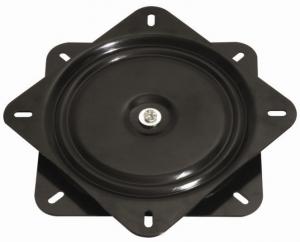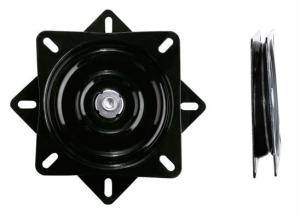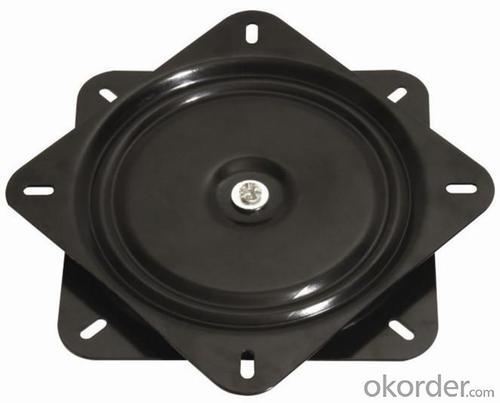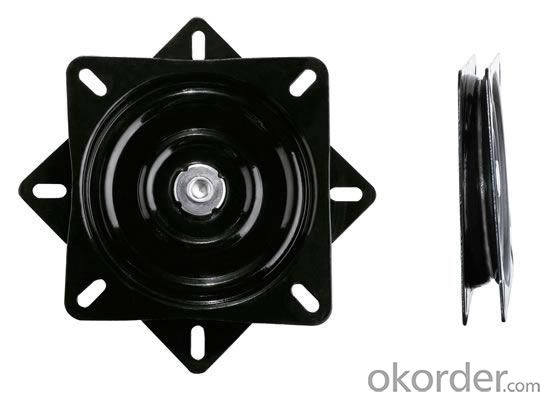Swivel Plates A-02
- Loading Port:
- China Main port
- Payment Terms:
- TT or LC
- Min Order Qty:
- 1000pcs pc
- Supply Capability:
- 40000 Pieces Per Month pc/month
OKorder Service Pledge
OKorder Financial Service
You Might Also Like
Quick Details of Swivel Plates A-02:
Type: Chair Mechanism,bar stool turntables Place of Origin: Guangdong, China (Mainland) Material: iron Net weight: 1.13kg/pcs (2.5mm) Height: 20-26mm Thickness: 2.0/2.5/3.0mm,2.0mm/2.5mm/3.0mm Certificate: SGS , Salt spray
Specifications of Swivel Plates A-02:
1.Size 158*158 mm
2.A3 steel plate
3.Color: black
4.Good MOQ and quickly delivery
5.Factory offer cheap price
Item No.: A04
Material : iron
Net weight : 1.13kg/pcs (Thickness=2.5mm)
packing size : 29*29*16.5cm
Pcs/ctn: 20 pcs
Product Photos:
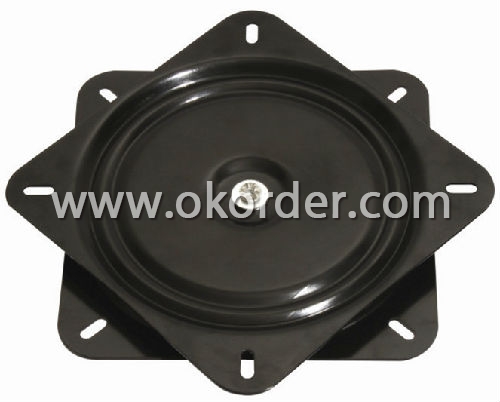
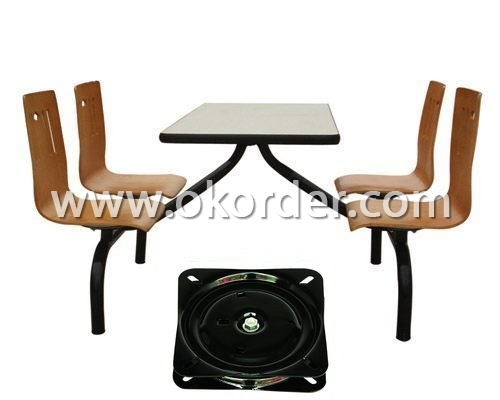
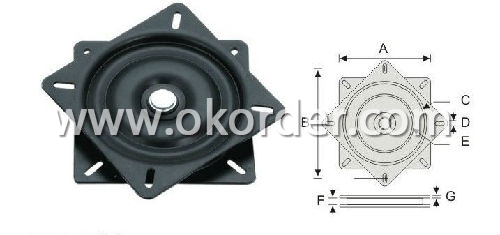
Packaging & Delivery:
Packaging Details: 20pcs/carton, size 29*29.16.5cm, GW: 23kg/ctn
Delivery Detail: 10 days after receive your 30% deposit for order
- Q: How is shock-resistant alloy steel used in the production of impact-resistant parts?
- Shock-resistant alloy steel is used in the production of impact-resistant parts to enhance their durability and toughness. This type of steel is specifically designed to withstand high impact forces, making it ideal for applications where parts are subjected to intense shock or sudden impact loads. By incorporating shock-resistant alloy steel into the manufacturing process, impact-resistant parts can better absorb and distribute the energy from impacts, thereby reducing the risk of damage or failure.
- Q: How does special steel contribute to improving product performance under extreme conditions?
- Special steel contributes to improving product performance under extreme conditions by offering enhanced strength, corrosion resistance, and high temperature stability. Its unique composition and manufacturing processes allow it to withstand extreme temperatures, pressures, and harsh environments, ensuring the reliability and durability of products in challenging circumstances. Additionally, special steel's superior mechanical properties and ability to maintain structural integrity enable it to resist wear, fatigue, and deformation, thus improving the overall performance and longevity of products when exposed to extreme conditions.
- Q: Can special steel be used in the construction equipment manufacturing industry?
- Yes, special steel can be used in the construction equipment manufacturing industry. Special steel, such as high-strength or wear-resistant steel, can provide enhanced durability and performance to construction equipment, making it suitable for demanding applications in the industry.
- Q: Can special steel be used for automotive engine components?
- Yes, special steel can be used for automotive engine components. Special steels, such as high-strength alloys or heat-resistant grades, are often utilized in critical engine parts like crankshafts, camshafts, connecting rods, valves, and pistons. These specialized steels offer enhanced strength, durability, and resistance to wear and high temperatures, ensuring reliable performance and longevity in demanding automotive engine applications.
- Q: What are the different methods of surface electropolishing for special steel?
- There are several methods of surface electropolishing for special steel, including the use of acid-based or alkaline-based electrolytes, pulse current electropolishing, and reverse current electropolishing. The choice of method depends on factors such as the type of special steel being treated and the desired surface finish.
- Q: How does special steel comply with international standards?
- Special steel, specifically designed and manufactured to possess exceptional properties and performance, undergoes a rigorous process to ensure its quality and conformity to established norms. To begin with, adherence to international standards in the production of special steel is achieved through the meticulous selection of raw materials. The composition and quality of these materials are carefully controlled and tested to meet the specifications outlined by international standards organizations. This guarantees that the resulting special steel is of the desired quality and possesses the necessary mechanical properties. In addition, standardized production processes are followed by special steel manufacturers. These processes are designed in accordance with international guidelines and standards to ensure consistency and traceability. Through the use of advanced technologies and quality control measures, manufacturers can monitor and control every stage of production, from melting and casting to rolling and heat treatment. This guarantees that the final product meets the required standards in terms of chemical composition, mechanical properties, and dimensional tolerances. Moreover, stringent testing and inspection procedures are conducted to validate the compliance of special steel with international standards. Certified laboratories and independent third-party agencies perform various destructive and non-destructive testing methods, such as ultrasonic testing, hardness testing, and microstructure analysis. These tests ensure unbiased and accurate results. Furthermore, special steel manufacturers often have their production processes and quality management systems audited and certified by recognized bodies, like ISO, to demonstrate their commitment to compliance with international standards. It is also important to note that special steel manufacturers actively participate in international standardization committees, such as ASTM International and ISO. By engaging in these committees, they contribute to the development and revision of international standards, ensuring that their products remain up to date and aligned with the latest industry requirements. In conclusion, special steel complies with international standards through careful raw material selection, adherence to standardized production processes, rigorous testing and inspection, and active participation in international standardization committees. By following these measures, special steel manufacturers demonstrate their dedication to producing high-quality products that meet the strict requirements of international standards.
- Q: How does special steel contribute to reducing product costs?
- Special steel contributes to reducing product costs in several ways. Firstly, special steel is known for its high strength and durability, which allows manufacturers to design and produce products that have a longer lifespan. This reduces the need for frequent replacements or repairs, thus saving costs in the long run. Additionally, special steel can be customized to meet specific requirements, allowing for the production of lighter and more efficient products. This can lead to savings in terms of raw material usage, transportation costs, and energy consumption. Moreover, special steel often has excellent corrosion resistance, reducing the need for additional protective coatings or maintenance, which can also result in cost savings. Overall, the utilization of special steel in manufacturing processes helps optimize product performance, longevity, and efficiency, thereby contributing to reducing product costs.
- Q: What are the common alloying elements in special steel?
- Special steel commonly contains alloying elements such as chromium, nickel, molybdenum, and vanadium. The addition of chromium improves the steel's resistance to corrosion and increases its hardness. Nickel is utilized to enhance the steel's toughness and ability to withstand extreme temperatures. Molybdenum is frequently incorporated to strengthen the steel and improve its resistance to wear and corrosion. Vanadium, on the other hand, is recognized for its capability to increase the steel's hardness and strength, making it ideal for applications that necessitate high durability. These alloying elements are meticulously chosen and included in special steel to attain specific properties and fulfill the distinctive demands of various industries including automotive, aerospace, and construction.
- Q: How does special steel contribute to reducing product defects?
- Special steel contributes to reducing product defects by offering superior strength, durability, and corrosion resistance compared to regular steel. This ensures that the components made from special steel are less prone to breakage, wear and tear, or damage during manufacturing, transportation, or usage. Special steel's high-quality characteristics provide a more reliable and consistent performance, resulting in fewer product defects and improved overall product quality.
- Q: What are the different methods of non-destructive testing for special steel?
- There are several methods of non-destructive testing (NDT) that can be used to evaluate the quality and integrity of special steel without causing any damage. These methods include: 1. Ultrasonic Testing (UT): This method uses high-frequency sound waves to detect defects, such as cracks or voids, within the special steel. A transducer is used to emit sound waves into the material, and the reflections or echoes are analyzed to identify any anomalies. 2. Magnetic Particle Testing (MT): This technique is based on the principle of magnetic fields and is primarily used to detect surface or near-surface defects in special steel. A magnetic field is induced in the material, and magnetic particles are applied. Any discontinuities or defects will cause the particles to gather, forming visible indications. 3. Liquid Penetrant Testing (PT): This method involves applying a liquid dye or penetrant to the surface of the special steel. The penetrant is drawn into any surface defects through capillary action. After a certain period, excess penetrant is removed, and a developer is applied to make the indications visible. 4. Radiographic Testing (RT): This technique utilizes X-rays or gamma rays to inspect the internal structure of special steel. The material is exposed to radiation, and a film or digital detector captures the transmitted radiation. Any inconsistencies or defects within the material will be visible on the resulting image. 5. Eddy Current Testing (ECT): ECT is mainly used for detecting surface or near-surface defects in special steel. It works by inducing an alternating current into a coil, creating an electromagnetic field. Any variations in the material's electrical conductivity or magnetic permeability caused by defects will generate changes in the coil's impedance, which can be analyzed. 6. Visual Testing (VT): Although not a direct NDT method, visual inspection is often used as a preliminary step to identify surface defects or irregularities in special steel. This method involves a thorough visual examination of the material using appropriate lighting and magnification tools. These different methods of non-destructive testing for special steel provide valuable insights into the material's quality, helping ensure its structural integrity and reliability in various applications. The choice of method depends on factors such as the type of defect being sought, the location of the material, and the specific requirements of the industry or application involved.
1. Manufacturer Overview
| Location | Guangdong, China |
| Year Established | 1996 |
| Annual Output Value | US$ 5 to US$ 10 Million |
| Main Markets | 40.00% Domestic Market 10.00% Eastern Asia 10.00% Eastern Europe 8.00% Southeast Asia 8.00% South America 5.00% South Asia 5.00% Southern Europe 5.00% North America |
| Company Certifications | Test report for 3 section slide |
2. Manufacturer Certificates
| a) Certification Name | |
| Range | |
| Reference | |
| Validity Period |
3. Manufacturer Capability
| a) Trade Capacity | |
| Nearest Port | Shunde, Huangpu, Shenzhen |
| Export Percentage | 61% - 70% |
| No.of Employees in Trade Department | 3-5 People |
| Language Spoken: | English, Chinese, Spanish, Japanese |
| b) Factory Information | |
| Factory Size: | 1,000-3,000 square meters |
| No. of Production Lines | 3 |
| Contract Manufacturing | OEM Service Offered Design Service Offered Buyer Label Offered |
| Product Price Range | Average |
Send your message to us
Swivel Plates A-02
- Loading Port:
- China Main port
- Payment Terms:
- TT or LC
- Min Order Qty:
- 1000pcs pc
- Supply Capability:
- 40000 Pieces Per Month pc/month
OKorder Service Pledge
OKorder Financial Service
Similar products
Hot products
Hot Searches
Related keywords
